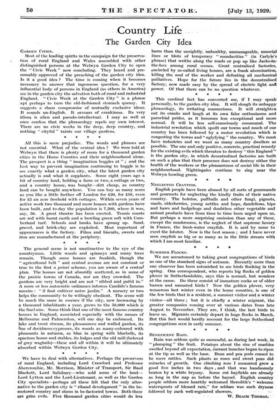We have to deal with alternatives. Perhaps the preservers of
rural England, including Lord Crawford and Professor Abercrombie, Mr. Morrison, Minister of Transport, Sir Basil Blackett, Lord Salisbury—who sold some of the land— Lord Lytton and the Lord-Lieutenant, as well as the Garden City specialists—perhaps all these felt that the only alter- native to the garden c-ity is " riband development " in the be- motored country and slums in be-factoried towns. Both these are grim evils. Five thousand garden cities would- do less harm than the unsightly, unhealthy, unmanageable, unsocial lines or blots of temporary " mendacities " (in Carlyle's phrase) that writhe along the roads or pop up like Jacks,in- the-box among rural scenes. Great centralised factories, encircled by so-called living houses, are a frank abomination, killing the, soul of the worker and defeating all mechanical palliatives. Hope for the future lies in the decentaalised factory, now made easy by the spread of electric light and power. Of that there can be no question whatever.
































 Previous page
Previous page